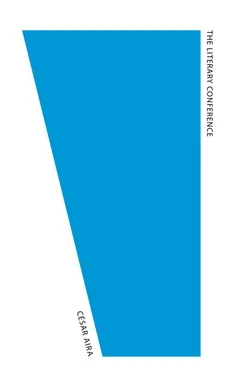César Aira - The Literary Conference
Здесь есть возможность читать онлайн «César Aira - The Literary Conference» весь текст электронной книги совершенно бесплатно (целиком полную версию без сокращений). В некоторых случаях можно слушать аудио, скачать через торрент в формате fb2 и присутствует краткое содержание. Год выпуска: 2010, ISBN: 2010, Издательство: New Directions, Жанр: Современная проза, на английском языке. Описание произведения, (предисловие) а так же отзывы посетителей доступны на портале библиотеки ЛибКат.
- Название:The Literary Conference
- Автор:
- Издательство:New Directions
- Жанр:
- Год:2010
- ISBN:9780811219839
- Рейтинг книги:4 / 5. Голосов: 1
-
Избранное:Добавить в избранное
- Отзывы:
-
Ваша оценка:
- 80
- 1
- 2
- 3
- 4
- 5
The Literary Conference: краткое содержание, описание и аннотация
Предлагаем к чтению аннотацию, описание, краткое содержание или предисловие (зависит от того, что написал сам автор книги «The Literary Conference»). Если вы не нашли необходимую информацию о книге — напишите в комментариях, мы постараемся отыскать её.
is the perfect vehicle for César Aira’s take over of literature in the 21st century.
The Literary Conference — читать онлайн бесплатно полную книгу (весь текст) целиком
Ниже представлен текст книги, разбитый по страницам. Система сохранения места последней прочитанной страницы, позволяет с удобством читать онлайн бесплатно книгу «The Literary Conference», без необходимости каждый раз заново искать на чём Вы остановились. Поставьте закладку, и сможете в любой момент перейти на страницу, на которой закончили чтение.
Интервал:
Закладка:
So, once upon a time. . an Argentinean scientist conducted experiments in the cloning of cells, organs, and limbs, and achieved the ability to reproduce, at will, whole individuals in indefinite quantities. First, he worked with insects, then higher animals, and finally human beings. His success did not vary, though as he approached human beings the nature of the clones subtly changed; they became non-similar clones. He overcame his disappointment with this variation by telling himself that in the final analysis the perception of similarity is quite subjective and always questionable. He had no doubt, however, that his clones were genuine, legions of Ones whose numbers he could multiply as often as he wished.
At this point he reached an impasse and found himself unable to proceed toward his final goal, which was nothing less than world domination. In this respect he was the typical Mad Scientist of the comic books. He was incapable of setting a more modest goal for himself; at his level, it simply wouldn’t have been worth his while. He then discovered that to achieve this final goal, his armies of clones (virtual, in the meantime, because for practical reasons he had created only a few samples) were utterly useless.
In a certain sense he had become a prisoner of his own success, according to the classic depiction of the Mad Scientist, who, in the course of the adventure itself, in the politics of the action, always ends up defeated, no matter how great his previous achievements in the field of science have been. Fortunately for him, he was not truly mad — his thirst for power had not blinded him; around the edges he retained enough lucidity to change the direction of his experiments. This was possible due to the material conditions under which he carried them out: the precarious conditions of a do-it-yourself amateur, making do with cardboard boxes and bottles, with recycled toys and bargain basement made-in-China retorts. He had set up his laboratory in the tiny servant’s room in his old apartment; as he had no morgue, he let his human clones roam the streets of the neighborhood. Poverty, which had caused him so much frustration, revealed its positive aspect when he saw that he could only achieve his goals by radically transforming his methods, something he could do without any adverse effect on his investments or installations, which either didn’t exist or were worth nothing at all.
The problem, and the solution, were the following: he could create a human being from a single cell, a being that was identical in body and soul to the specimen from which the cell was taken. One or many, as many as he wished. Up to this point, everything was okay. The only difficulty, paradoxical if you wish, is that these creatures had to be at his mercy. He could not be at their mercy. They could obey him, but he couldn’t obey them; he saw no reason to do so: they were beings with no prestige, no ideas, no originality. This circumstance thwarted all further action, for he still had to carry the burden of the initiative. And what could he do, even as the general in charge of countless legions, to achieve his ultimate goal of world domination? Declare war? Launch an assault against those in power? It would be his to lose. He didn’t even have weapons, nor did he know how to acquire them; weapons could not be reproduced through cloning; cloning worked only on living organic material; thus, life was the only element he could count on. And the mere multiplication of life cannot be considered a weapon, at least not under his conditions, through cloning. The miracle of the spontaneous creation of an additional nervous system was cancelled out by stripping it, from the outset, of the ability to give orders, and with that, to create.
It was on this point that our Mad Scientist most differed from the stereotype of the Mad Scientist, who would typically dig in his heels with self-destructive resolve in order to maintain the central role of his own intellect. Ours reached the conclusion that he could only manage to take a “leap forward” from his current stage if he found a way to get out from the middle, if his intellect could be placed at the service of another intellect, his power at the service of another greater power. . if his will deteriorated within a system of external gravitations. Therein lay his unparalleled originality (as far as Mad Scientists go): in recognizing that “another” idea is always more efficient than “an” idea, by the mere virtue of being an-other. And an idea does not get enriched through expansion or multiplication (clones) but rather by passing through another brain.
So, what to do? The obvious solution was to clone a superior man. . Though choosing which one was not a simple matter. Superiority is a relative condition and eminently subject to disagreement. Above all, it is not easy to decide from one’s own point of view, which is the only point of view at one’s disposition. And the adoption of objective criteria can be deceptive; be that as it may, he had no choice but to adopt some kind of objective criteria, which he would then need to refine. In the first instance, he had to disregard statistical appearances, such as would predominate in a survey, which would skew the sample toward those at the top of the visible pyramid of power: heads of state, business magnates, generals. . No. Just thinking about this put a smile on his lips, the same smile he could well imagine appearing on the lips of those who wielded true power upon hearing those words. Because life experience had taught him that, say what you will, real power — which makes one smile with disdain at apparent power — resided in a different kind of person whose central and defining acquisition was high culture: Philosophy, History, Literature, the Classics. The self-proclaimed stand-ins from popular culture and advanced technology, and those who had accumulated enormous fortunes through financial manipulation, were ineffectual shams. In fact, high culture’s disguise as something old fashioned and out-of-date was the perfect strategy to disorient the unsuspecting masses. This is why high culture continued to be the almost exclusive privilege of the upper classes. But the Mad Scientist wasn’t even thinking of cloning a member of that class. Precisely because they were so fully guaranteed the exercise of definitive and ultimate power, and because this guarantee lasted throughout all successive generations, they didn’t suit his purposes. Then he thought of resorting to a great criminal, but this was a romantic notion, compelling only for its Nietzschean resonance, and at its core, absurd.
Finally, he decided on what was simplest and most effective: a Celebrity. A recognized and celebrated Genius. To clone a genius! This was the decisive step. This would set him firmly on the road to world domination (because, among other reasons, he’d already covered half of it). He felt the excitement of a momentous moment. Beyond this decision, he had no need to make plans or harbor hopes, for everything would be placed, “invested,” in the Great Man, who would take charge because he was superior. As for the scientist, he would remain free from all responsibility — other than his role as the bootlicker, the heinous clown — and his own incompetence, his poverty and his blunders, would no longer matter; on the contrary, they would become his trump cards.
He chose his genius carefully, or better said, he didn’t need to choose him because fate placed him in his path, within reach: the most unassailable and undisputed genius there could ever be; his level of respectability touched on the transcendent. This was his natural target, and he set to work without further delay.
To say that he had him “within reach” is an exaggeration; in our celebrity culture, celebrities live isolated behind impregnable walls of privacy and move around inside invisible fortresses nobody can breach. But the same opportunity that had called him to his attention also brought him more or less close by. . He didn’t need to be too close. All he needed was one cell from his body, any cell, for each one contains the information necessary to clone the entire individual. Unwilling to trust fate to afford him the opportunity to obtain a hair or a nail trimming or a flake of skin, he employed one of his most trusted creatures, a small wasp reduced to the size of a period and loaded from birth with the identifying data of the aforementioned Genius; he sent her on her secret mission at noon under conditions of certain proximity (the wasp has a very short flight range). He trusted her blindly for he knew her to be at the mercy of the infallible force of instinct, of never-erring Nature. And she did not disappoint him: ten minutes later she returned, carrying the cell on her feet. . He immediately placed it on the slide of his pocket microscope and became ecstatic. The strength of his strategy was confirmed: it was a gorgeous cell, deep, filled with languages, iridescent, a limpid blue with transparent highlights. He’d never seen such a cell, it almost didn’t seem human. He placed it in the portable cloning machine he had brought with him, called a taxi, told the driver to take him to the highest plateau in the vicinity, continued from there on foot for a few hours, and when he had reached windswept heights where he was gasping for breath, he looked around for a remote spot to leave the machine. Incubation on a mountain peak was not a poetic detail: the specific conditions of pressure and temperature at these altitudes were what the process required: to reproduce them artificially he would need to be in his modest laboratory, from which he was separated by thousands of miles, and he feared the cell would not survive the rigors of the journey, or would lose its vitality. He left it there and climbed down. Now all he could do was wait. .
Читать дальшеИнтервал:
Закладка:
Похожие книги на «The Literary Conference»
Представляем Вашему вниманию похожие книги на «The Literary Conference» списком для выбора. Мы отобрали схожую по названию и смыслу литературу в надежде предоставить читателям больше вариантов отыскать новые, интересные, ещё непрочитанные произведения.
Обсуждение, отзывы о книге «The Literary Conference» и просто собственные мнения читателей. Оставьте ваши комментарии, напишите, что Вы думаете о произведении, его смысле или главных героях. Укажите что конкретно понравилось, а что нет, и почему Вы так считаете.












